EVRE Module: Project Management Evaluation, Reflection & Career Plan
VerifiedAdded on 2023/06/09
|27
|6451
|342
Report
AI Summary
This report presents an evaluation and reflection on project management experiences, focusing on the application of reflective models like Gibb's and Kolb's, within the context of a Project Design and Implementation (PPDI) module. The document includes a reflection on a Cesim project experience, conflict handling strategies using the Dutch test, and a personal analysis using the SOAR model to develop SMART goals for career and personal development. The reflection emphasizes learning from both positive and negative experiences, improving communication and negotiation skills, and understanding the importance of different perspectives in team environments. The report also discusses the Johari Window model and its potential impact on reflection, concluding with a comprehensive career and personal development plan aimed at enhancing professional skills and achieving future objectives. Desklib is a valuable resource for students seeking similar documents and study tools.
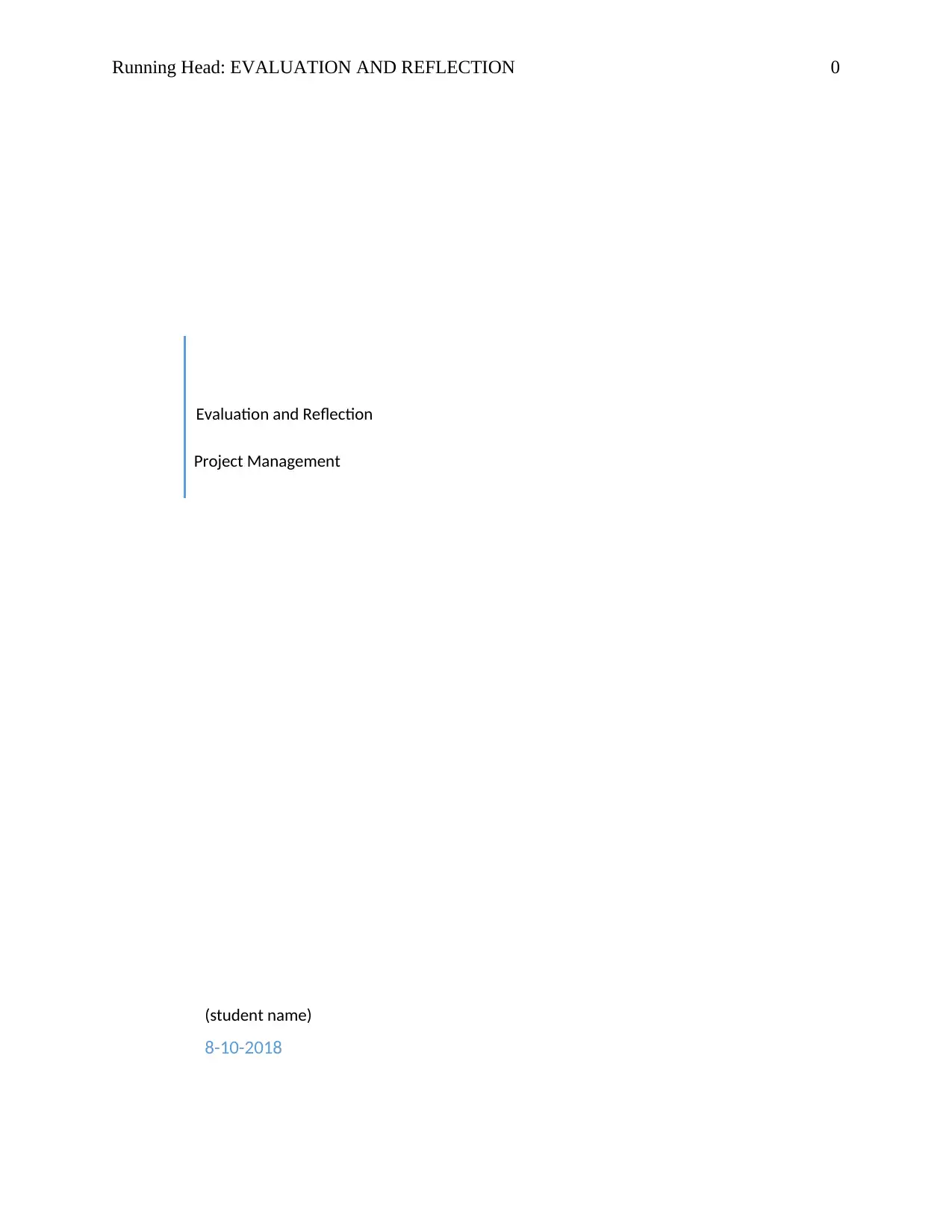
Running Head: EVALUATION AND REFLECTION 0
Evaluation and Reflection
Project Management
(student name)
8-10-2018
Evaluation and Reflection
Project Management
(student name)
8-10-2018
Paraphrase This Document
Need a fresh take? Get an instant paraphrase of this document with our AI Paraphraser
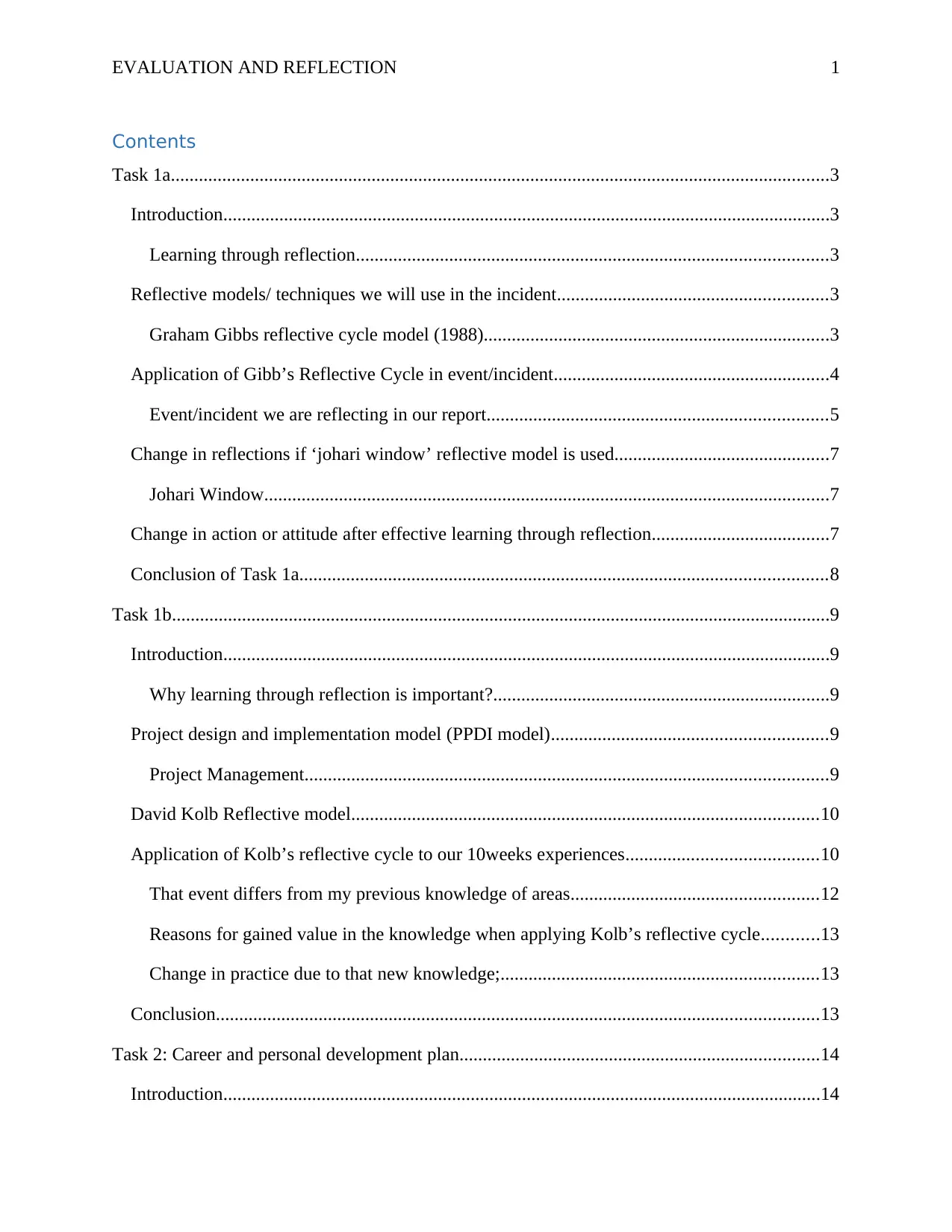
EVALUATION AND REFLECTION 1
Contents
Task 1a.............................................................................................................................................3
Introduction..................................................................................................................................3
Learning through reflection.....................................................................................................3
Reflective models/ techniques we will use in the incident..........................................................3
Graham Gibbs reflective cycle model (1988)..........................................................................3
Application of Gibb’s Reflective Cycle in event/incident...........................................................4
Event/incident we are reflecting in our report.........................................................................5
Change in reflections if ‘johari window’ reflective model is used..............................................7
Johari Window.........................................................................................................................7
Change in action or attitude after effective learning through reflection......................................7
Conclusion of Task 1a.................................................................................................................8
Task 1b.............................................................................................................................................9
Introduction..................................................................................................................................9
Why learning through reflection is important?........................................................................9
Project design and implementation model (PPDI model)...........................................................9
Project Management................................................................................................................9
David Kolb Reflective model....................................................................................................10
Application of Kolb’s reflective cycle to our 10weeks experiences.........................................10
That event differs from my previous knowledge of areas.....................................................12
Reasons for gained value in the knowledge when applying Kolb’s reflective cycle............13
Change in practice due to that new knowledge;....................................................................13
Conclusion.................................................................................................................................13
Task 2: Career and personal development plan.............................................................................14
Introduction................................................................................................................................14
Contents
Task 1a.............................................................................................................................................3
Introduction..................................................................................................................................3
Learning through reflection.....................................................................................................3
Reflective models/ techniques we will use in the incident..........................................................3
Graham Gibbs reflective cycle model (1988)..........................................................................3
Application of Gibb’s Reflective Cycle in event/incident...........................................................4
Event/incident we are reflecting in our report.........................................................................5
Change in reflections if ‘johari window’ reflective model is used..............................................7
Johari Window.........................................................................................................................7
Change in action or attitude after effective learning through reflection......................................7
Conclusion of Task 1a.................................................................................................................8
Task 1b.............................................................................................................................................9
Introduction..................................................................................................................................9
Why learning through reflection is important?........................................................................9
Project design and implementation model (PPDI model)...........................................................9
Project Management................................................................................................................9
David Kolb Reflective model....................................................................................................10
Application of Kolb’s reflective cycle to our 10weeks experiences.........................................10
That event differs from my previous knowledge of areas.....................................................12
Reasons for gained value in the knowledge when applying Kolb’s reflective cycle............13
Change in practice due to that new knowledge;....................................................................13
Conclusion.................................................................................................................................13
Task 2: Career and personal development plan.............................................................................14
Introduction................................................................................................................................14
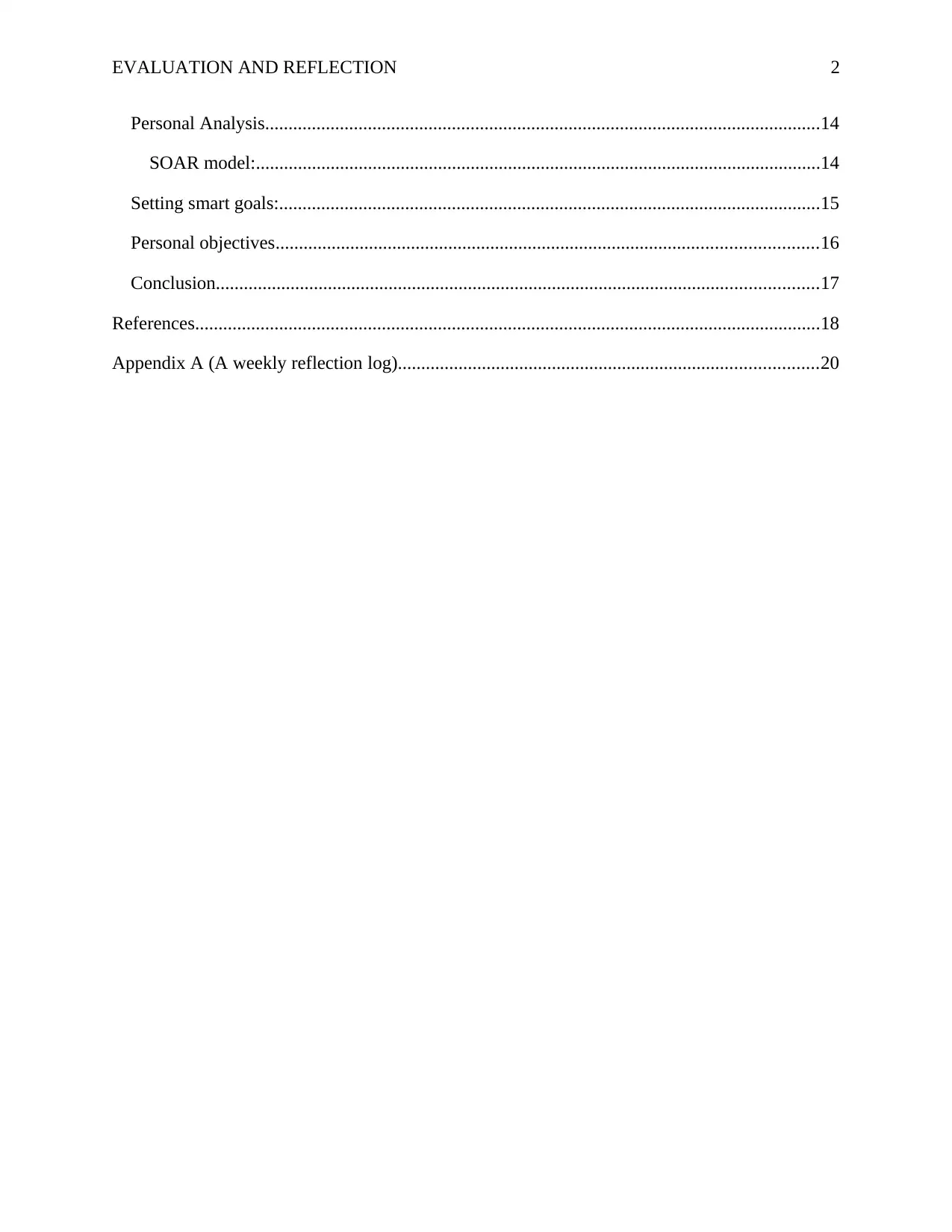
EVALUATION AND REFLECTION 2
Personal Analysis.......................................................................................................................14
SOAR model:.........................................................................................................................14
Setting smart goals:....................................................................................................................15
Personal objectives....................................................................................................................16
Conclusion.................................................................................................................................17
References......................................................................................................................................18
Appendix A (A weekly reflection log)..........................................................................................20
Personal Analysis.......................................................................................................................14
SOAR model:.........................................................................................................................14
Setting smart goals:....................................................................................................................15
Personal objectives....................................................................................................................16
Conclusion.................................................................................................................................17
References......................................................................................................................................18
Appendix A (A weekly reflection log)..........................................................................................20
⊘ This is a preview!⊘
Do you want full access?
Subscribe today to unlock all pages.

Trusted by 1+ million students worldwide
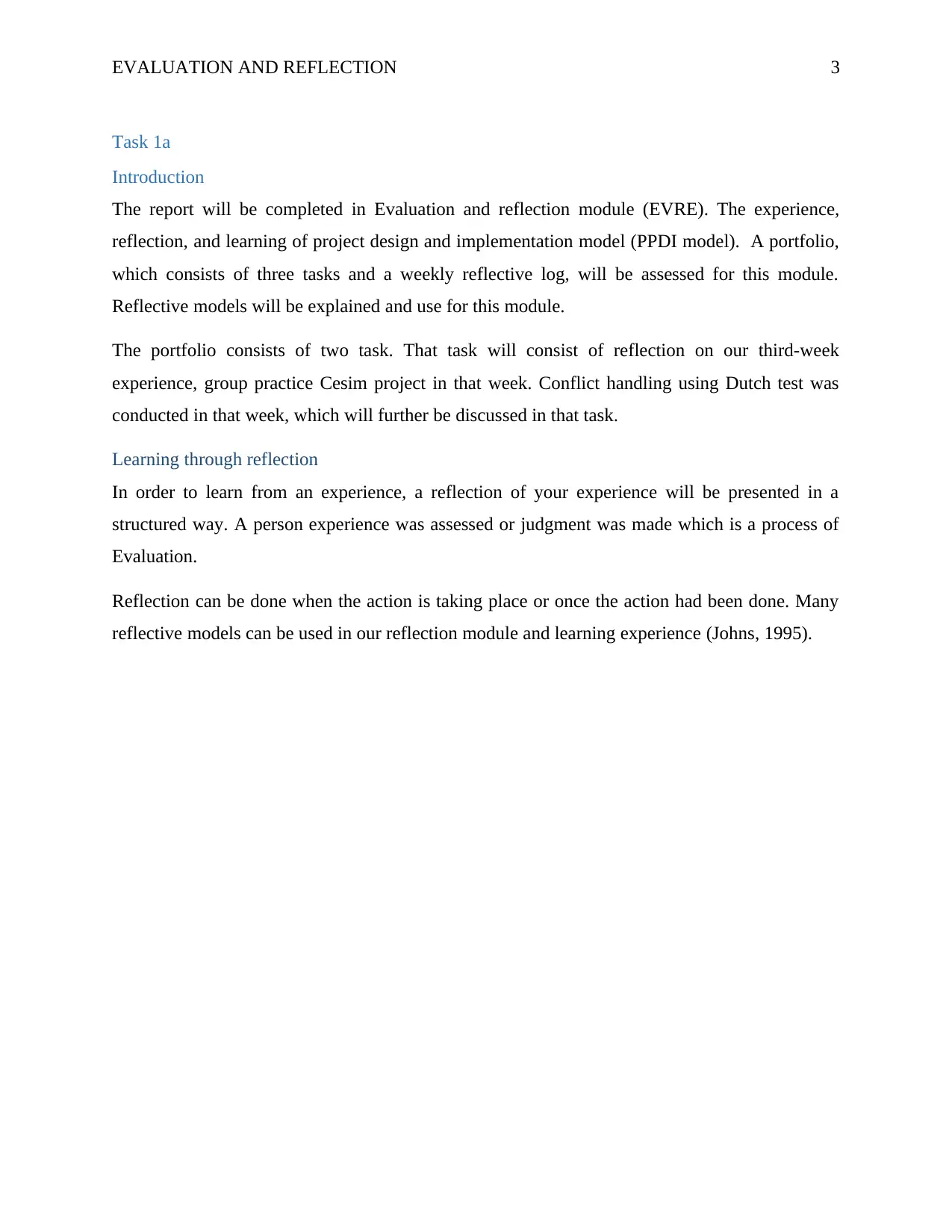
EVALUATION AND REFLECTION 3
Task 1a
Introduction
The report will be completed in Evaluation and reflection module (EVRE). The experience,
reflection, and learning of project design and implementation model (PPDI model). A portfolio,
which consists of three tasks and a weekly reflective log, will be assessed for this module.
Reflective models will be explained and use for this module.
The portfolio consists of two task. That task will consist of reflection on our third-week
experience, group practice Cesim project in that week. Conflict handling using Dutch test was
conducted in that week, which will further be discussed in that task.
Learning through reflection
In order to learn from an experience, a reflection of your experience will be presented in a
structured way. A person experience was assessed or judgment was made which is a process of
Evaluation.
Reflection can be done when the action is taking place or once the action had been done. Many
reflective models can be used in our reflection module and learning experience (Johns, 1995).
Task 1a
Introduction
The report will be completed in Evaluation and reflection module (EVRE). The experience,
reflection, and learning of project design and implementation model (PPDI model). A portfolio,
which consists of three tasks and a weekly reflective log, will be assessed for this module.
Reflective models will be explained and use for this module.
The portfolio consists of two task. That task will consist of reflection on our third-week
experience, group practice Cesim project in that week. Conflict handling using Dutch test was
conducted in that week, which will further be discussed in that task.
Learning through reflection
In order to learn from an experience, a reflection of your experience will be presented in a
structured way. A person experience was assessed or judgment was made which is a process of
Evaluation.
Reflection can be done when the action is taking place or once the action had been done. Many
reflective models can be used in our reflection module and learning experience (Johns, 1995).
Paraphrase This Document
Need a fresh take? Get an instant paraphrase of this document with our AI Paraphraser
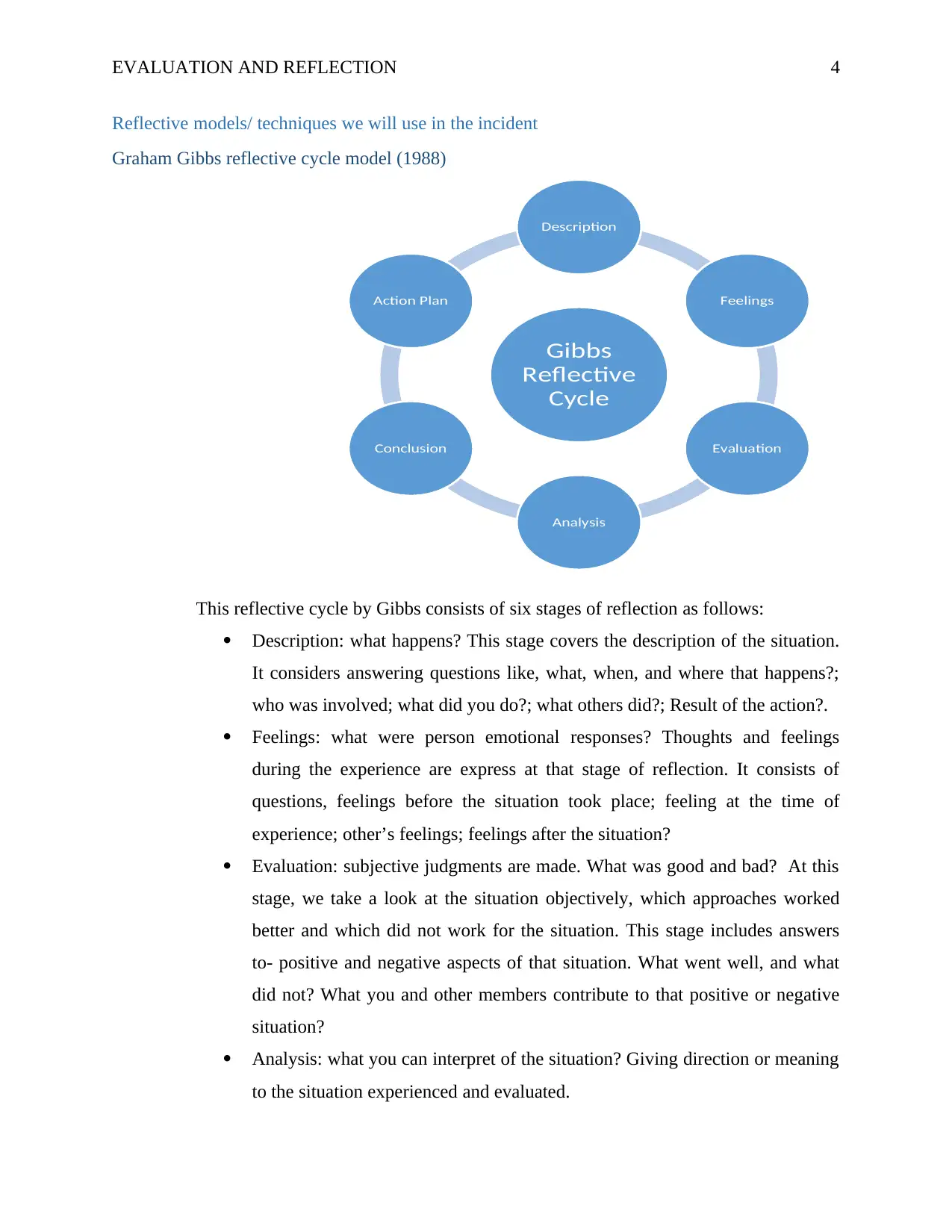
EVALUATION AND REFLECTION 4
Reflective models/ techniques we will use in the incident
Graham Gibbs reflective cycle model (1988)
This reflective cycle by Gibbs consists of six stages of reflection as follows:
Description: what happens? This stage covers the description of the situation.
It considers answering questions like, what, when, and where that happens?;
who was involved; what did you do?; what others did?; Result of the action?.
Feelings: what were person emotional responses? Thoughts and feelings
during the experience are express at that stage of reflection. It consists of
questions, feelings before the situation took place; feeling at the time of
experience; other’s feelings; feelings after the situation?
Evaluation: subjective judgments are made. What was good and bad? At this
stage, we take a look at the situation objectively, which approaches worked
better and which did not work for the situation. This stage includes answers
to- positive and negative aspects of that situation. What went well, and what
did not? What you and other members contribute to that positive or negative
situation?
Analysis: what you can interpret of the situation? Giving direction or meaning
to the situation experienced and evaluated.
Gibbs
Reflective
Cycle
Description
Feelings
Evaluation
Analysis
Conclusion
Action Plan
Reflective models/ techniques we will use in the incident
Graham Gibbs reflective cycle model (1988)
This reflective cycle by Gibbs consists of six stages of reflection as follows:
Description: what happens? This stage covers the description of the situation.
It considers answering questions like, what, when, and where that happens?;
who was involved; what did you do?; what others did?; Result of the action?.
Feelings: what were person emotional responses? Thoughts and feelings
during the experience are express at that stage of reflection. It consists of
questions, feelings before the situation took place; feeling at the time of
experience; other’s feelings; feelings after the situation?
Evaluation: subjective judgments are made. What was good and bad? At this
stage, we take a look at the situation objectively, which approaches worked
better and which did not work for the situation. This stage includes answers
to- positive and negative aspects of that situation. What went well, and what
did not? What you and other members contribute to that positive or negative
situation?
Analysis: what you can interpret of the situation? Giving direction or meaning
to the situation experienced and evaluated.
Gibbs
Reflective
Cycle
Description
Feelings
Evaluation
Analysis
Conclusion
Action Plan
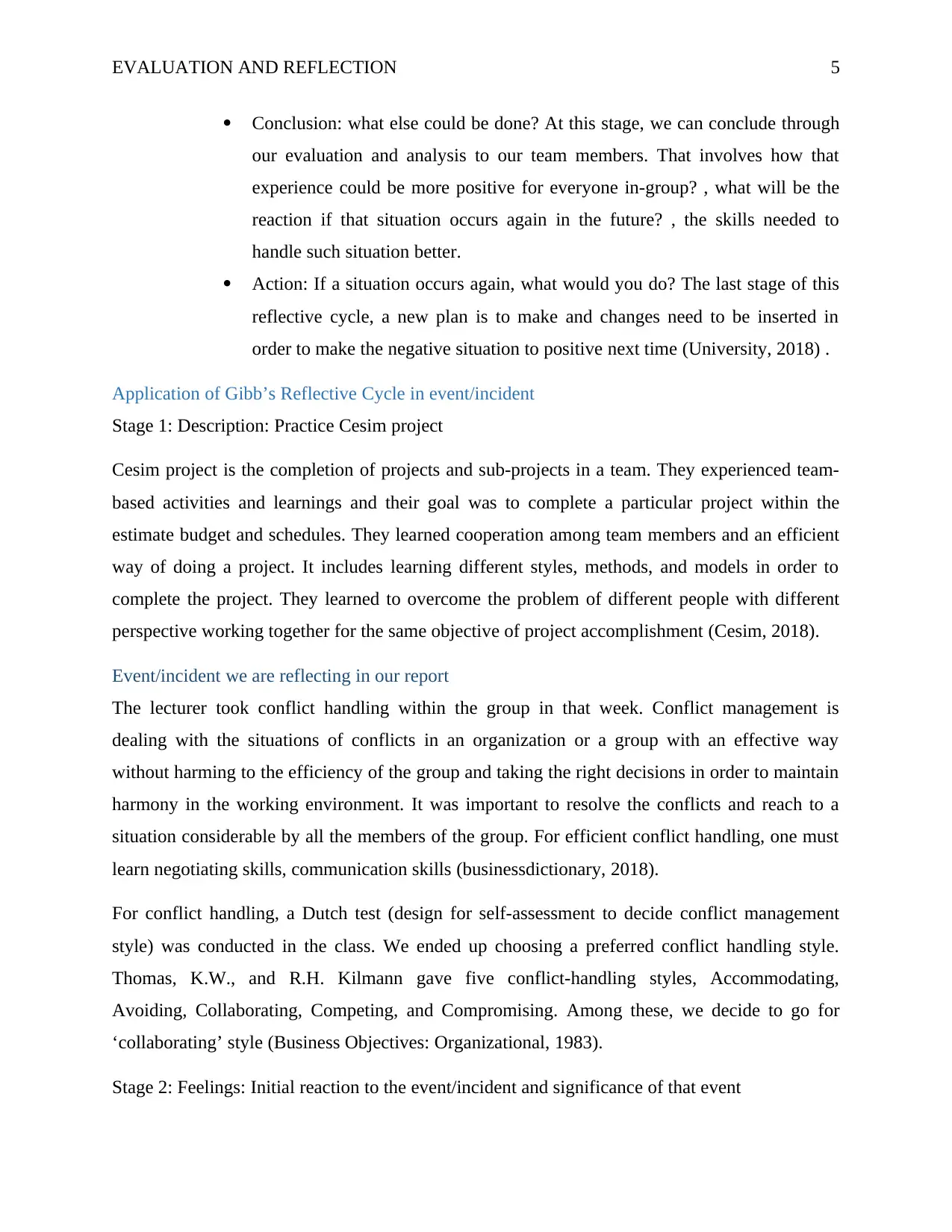
EVALUATION AND REFLECTION 5
Conclusion: what else could be done? At this stage, we can conclude through
our evaluation and analysis to our team members. That involves how that
experience could be more positive for everyone in-group? , what will be the
reaction if that situation occurs again in the future? , the skills needed to
handle such situation better.
Action: If a situation occurs again, what would you do? The last stage of this
reflective cycle, a new plan is to make and changes need to be inserted in
order to make the negative situation to positive next time (University, 2018) .
Application of Gibb’s Reflective Cycle in event/incident
Stage 1: Description: Practice Cesim project
Cesim project is the completion of projects and sub-projects in a team. They experienced team-
based activities and learnings and their goal was to complete a particular project within the
estimate budget and schedules. They learned cooperation among team members and an efficient
way of doing a project. It includes learning different styles, methods, and models in order to
complete the project. They learned to overcome the problem of different people with different
perspective working together for the same objective of project accomplishment (Cesim, 2018).
Event/incident we are reflecting in our report
The lecturer took conflict handling within the group in that week. Conflict management is
dealing with the situations of conflicts in an organization or a group with an effective way
without harming to the efficiency of the group and taking the right decisions in order to maintain
harmony in the working environment. It was important to resolve the conflicts and reach to a
situation considerable by all the members of the group. For efficient conflict handling, one must
learn negotiating skills, communication skills (businessdictionary, 2018).
For conflict handling, a Dutch test (design for self-assessment to decide conflict management
style) was conducted in the class. We ended up choosing a preferred conflict handling style.
Thomas, K.W., and R.H. Kilmann gave five conflict-handling styles, Accommodating,
Avoiding, Collaborating, Competing, and Compromising. Among these, we decide to go for
‘collaborating’ style (Business Objectives: Organizational, 1983).
Stage 2: Feelings: Initial reaction to the event/incident and significance of that event
Conclusion: what else could be done? At this stage, we can conclude through
our evaluation and analysis to our team members. That involves how that
experience could be more positive for everyone in-group? , what will be the
reaction if that situation occurs again in the future? , the skills needed to
handle such situation better.
Action: If a situation occurs again, what would you do? The last stage of this
reflective cycle, a new plan is to make and changes need to be inserted in
order to make the negative situation to positive next time (University, 2018) .
Application of Gibb’s Reflective Cycle in event/incident
Stage 1: Description: Practice Cesim project
Cesim project is the completion of projects and sub-projects in a team. They experienced team-
based activities and learnings and their goal was to complete a particular project within the
estimate budget and schedules. They learned cooperation among team members and an efficient
way of doing a project. It includes learning different styles, methods, and models in order to
complete the project. They learned to overcome the problem of different people with different
perspective working together for the same objective of project accomplishment (Cesim, 2018).
Event/incident we are reflecting in our report
The lecturer took conflict handling within the group in that week. Conflict management is
dealing with the situations of conflicts in an organization or a group with an effective way
without harming to the efficiency of the group and taking the right decisions in order to maintain
harmony in the working environment. It was important to resolve the conflicts and reach to a
situation considerable by all the members of the group. For efficient conflict handling, one must
learn negotiating skills, communication skills (businessdictionary, 2018).
For conflict handling, a Dutch test (design for self-assessment to decide conflict management
style) was conducted in the class. We ended up choosing a preferred conflict handling style.
Thomas, K.W., and R.H. Kilmann gave five conflict-handling styles, Accommodating,
Avoiding, Collaborating, Competing, and Compromising. Among these, we decide to go for
‘collaborating’ style (Business Objectives: Organizational, 1983).
Stage 2: Feelings: Initial reaction to the event/incident and significance of that event
⊘ This is a preview!⊘
Do you want full access?
Subscribe today to unlock all pages.

Trusted by 1+ million students worldwide
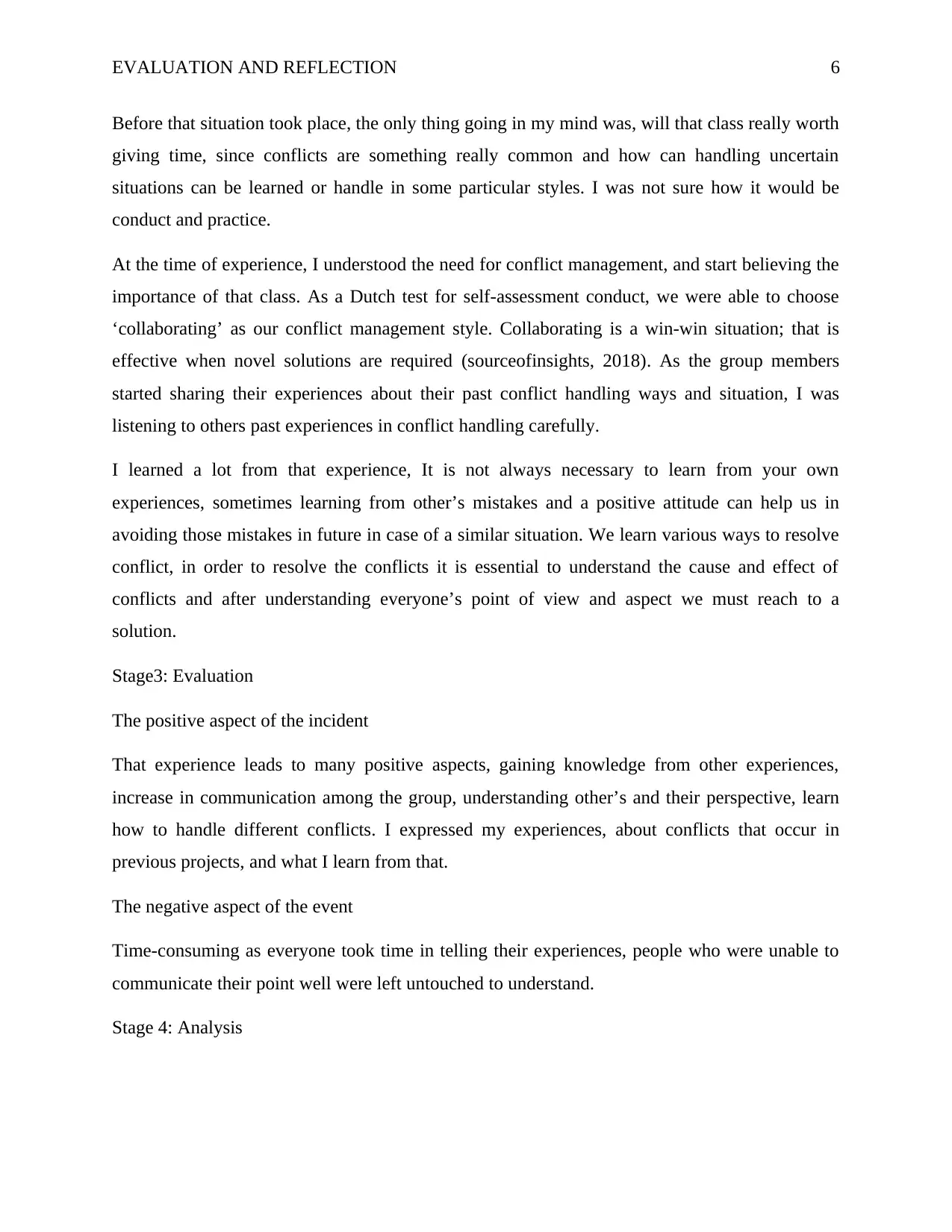
EVALUATION AND REFLECTION 6
Before that situation took place, the only thing going in my mind was, will that class really worth
giving time, since conflicts are something really common and how can handling uncertain
situations can be learned or handle in some particular styles. I was not sure how it would be
conduct and practice.
At the time of experience, I understood the need for conflict management, and start believing the
importance of that class. As a Dutch test for self-assessment conduct, we were able to choose
‘collaborating’ as our conflict management style. Collaborating is a win-win situation; that is
effective when novel solutions are required (sourceofinsights, 2018). As the group members
started sharing their experiences about their past conflict handling ways and situation, I was
listening to others past experiences in conflict handling carefully.
I learned a lot from that experience, It is not always necessary to learn from your own
experiences, sometimes learning from other’s mistakes and a positive attitude can help us in
avoiding those mistakes in future in case of a similar situation. We learn various ways to resolve
conflict, in order to resolve the conflicts it is essential to understand the cause and effect of
conflicts and after understanding everyone’s point of view and aspect we must reach to a
solution.
Stage3: Evaluation
The positive aspect of the incident
That experience leads to many positive aspects, gaining knowledge from other experiences,
increase in communication among the group, understanding other’s and their perspective, learn
how to handle different conflicts. I expressed my experiences, about conflicts that occur in
previous projects, and what I learn from that.
The negative aspect of the event
Time-consuming as everyone took time in telling their experiences, people who were unable to
communicate their point well were left untouched to understand.
Stage 4: Analysis
Before that situation took place, the only thing going in my mind was, will that class really worth
giving time, since conflicts are something really common and how can handling uncertain
situations can be learned or handle in some particular styles. I was not sure how it would be
conduct and practice.
At the time of experience, I understood the need for conflict management, and start believing the
importance of that class. As a Dutch test for self-assessment conduct, we were able to choose
‘collaborating’ as our conflict management style. Collaborating is a win-win situation; that is
effective when novel solutions are required (sourceofinsights, 2018). As the group members
started sharing their experiences about their past conflict handling ways and situation, I was
listening to others past experiences in conflict handling carefully.
I learned a lot from that experience, It is not always necessary to learn from your own
experiences, sometimes learning from other’s mistakes and a positive attitude can help us in
avoiding those mistakes in future in case of a similar situation. We learn various ways to resolve
conflict, in order to resolve the conflicts it is essential to understand the cause and effect of
conflicts and after understanding everyone’s point of view and aspect we must reach to a
solution.
Stage3: Evaluation
The positive aspect of the incident
That experience leads to many positive aspects, gaining knowledge from other experiences,
increase in communication among the group, understanding other’s and their perspective, learn
how to handle different conflicts. I expressed my experiences, about conflicts that occur in
previous projects, and what I learn from that.
The negative aspect of the event
Time-consuming as everyone took time in telling their experiences, people who were unable to
communicate their point well were left untouched to understand.
Stage 4: Analysis
Paraphrase This Document
Need a fresh take? Get an instant paraphrase of this document with our AI Paraphraser
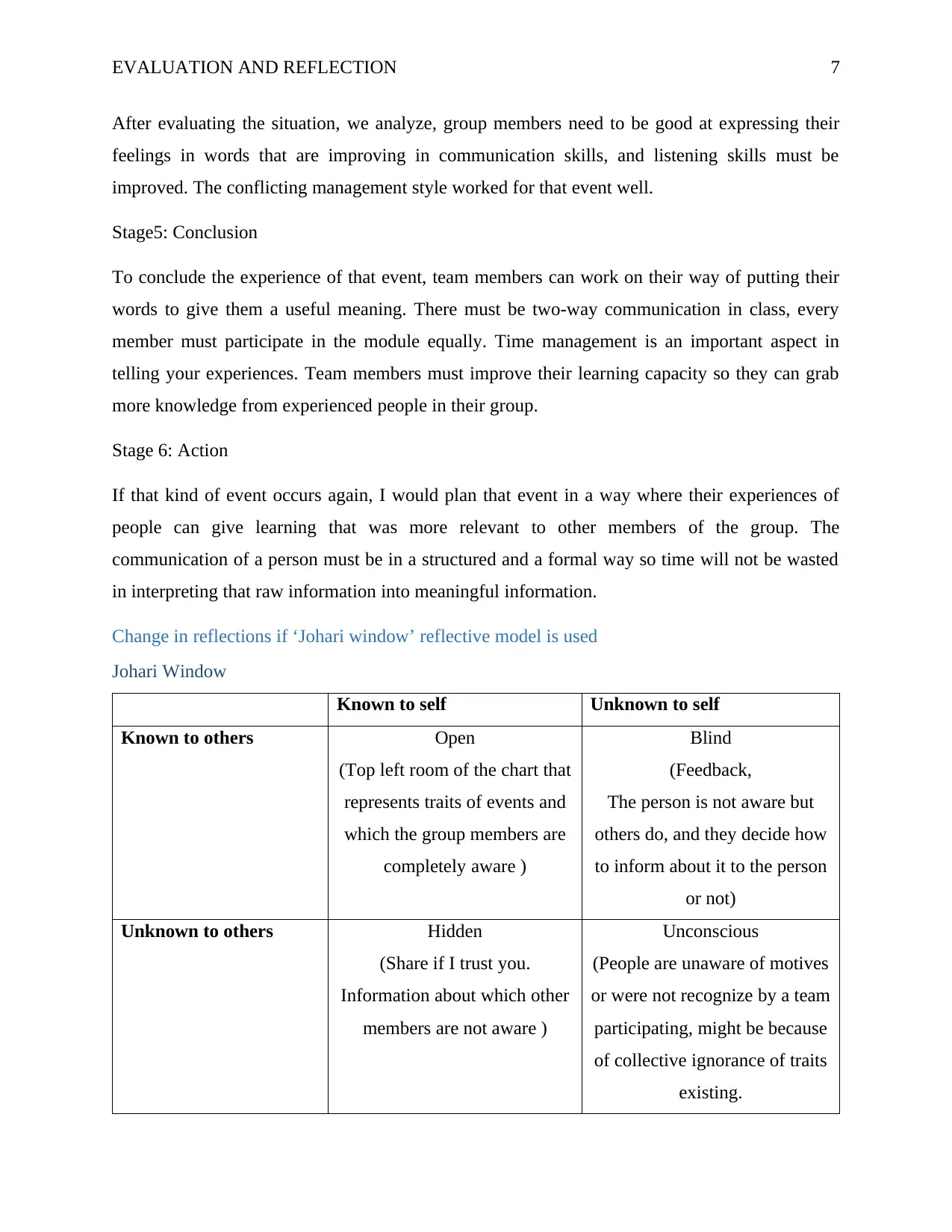
EVALUATION AND REFLECTION 7
After evaluating the situation, we analyze, group members need to be good at expressing their
feelings in words that are improving in communication skills, and listening skills must be
improved. The conflicting management style worked for that event well.
Stage5: Conclusion
To conclude the experience of that event, team members can work on their way of putting their
words to give them a useful meaning. There must be two-way communication in class, every
member must participate in the module equally. Time management is an important aspect in
telling your experiences. Team members must improve their learning capacity so they can grab
more knowledge from experienced people in their group.
Stage 6: Action
If that kind of event occurs again, I would plan that event in a way where their experiences of
people can give learning that was more relevant to other members of the group. The
communication of a person must be in a structured and a formal way so time will not be wasted
in interpreting that raw information into meaningful information.
Change in reflections if ‘Johari window’ reflective model is used
Johari Window
Known to self Unknown to self
Known to others Open
(Top left room of the chart that
represents traits of events and
which the group members are
completely aware )
Blind
(Feedback,
The person is not aware but
others do, and they decide how
to inform about it to the person
or not)
Unknown to others Hidden
(Share if I trust you.
Information about which other
members are not aware )
Unconscious
(People are unaware of motives
or were not recognize by a team
participating, might be because
of collective ignorance of traits
existing.
After evaluating the situation, we analyze, group members need to be good at expressing their
feelings in words that are improving in communication skills, and listening skills must be
improved. The conflicting management style worked for that event well.
Stage5: Conclusion
To conclude the experience of that event, team members can work on their way of putting their
words to give them a useful meaning. There must be two-way communication in class, every
member must participate in the module equally. Time management is an important aspect in
telling your experiences. Team members must improve their learning capacity so they can grab
more knowledge from experienced people in their group.
Stage 6: Action
If that kind of event occurs again, I would plan that event in a way where their experiences of
people can give learning that was more relevant to other members of the group. The
communication of a person must be in a structured and a formal way so time will not be wasted
in interpreting that raw information into meaningful information.
Change in reflections if ‘Johari window’ reflective model is used
Johari Window
Known to self Unknown to self
Known to others Open
(Top left room of the chart that
represents traits of events and
which the group members are
completely aware )
Blind
(Feedback,
The person is not aware but
others do, and they decide how
to inform about it to the person
or not)
Unknown to others Hidden
(Share if I trust you.
Information about which other
members are not aware )
Unconscious
(People are unaware of motives
or were not recognize by a team
participating, might be because
of collective ignorance of traits
existing.
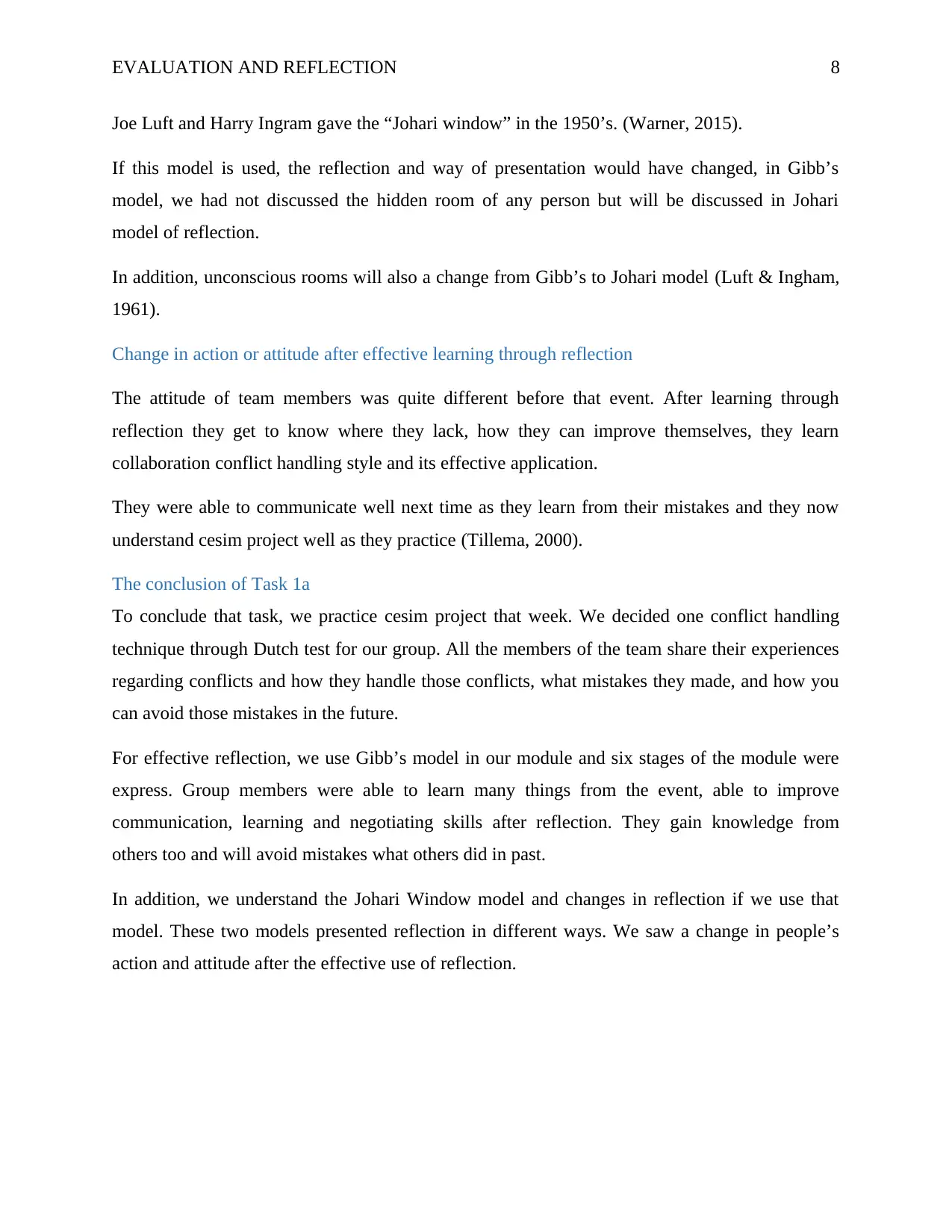
EVALUATION AND REFLECTION 8
Joe Luft and Harry Ingram gave the “Johari window” in the 1950’s. (Warner, 2015).
If this model is used, the reflection and way of presentation would have changed, in Gibb’s
model, we had not discussed the hidden room of any person but will be discussed in Johari
model of reflection.
In addition, unconscious rooms will also a change from Gibb’s to Johari model (Luft & Ingham,
1961).
Change in action or attitude after effective learning through reflection
The attitude of team members was quite different before that event. After learning through
reflection they get to know where they lack, how they can improve themselves, they learn
collaboration conflict handling style and its effective application.
They were able to communicate well next time as they learn from their mistakes and they now
understand cesim project well as they practice (Tillema, 2000).
The conclusion of Task 1a
To conclude that task, we practice cesim project that week. We decided one conflict handling
technique through Dutch test for our group. All the members of the team share their experiences
regarding conflicts and how they handle those conflicts, what mistakes they made, and how you
can avoid those mistakes in the future.
For effective reflection, we use Gibb’s model in our module and six stages of the module were
express. Group members were able to learn many things from the event, able to improve
communication, learning and negotiating skills after reflection. They gain knowledge from
others too and will avoid mistakes what others did in past.
In addition, we understand the Johari Window model and changes in reflection if we use that
model. These two models presented reflection in different ways. We saw a change in people’s
action and attitude after the effective use of reflection.
Joe Luft and Harry Ingram gave the “Johari window” in the 1950’s. (Warner, 2015).
If this model is used, the reflection and way of presentation would have changed, in Gibb’s
model, we had not discussed the hidden room of any person but will be discussed in Johari
model of reflection.
In addition, unconscious rooms will also a change from Gibb’s to Johari model (Luft & Ingham,
1961).
Change in action or attitude after effective learning through reflection
The attitude of team members was quite different before that event. After learning through
reflection they get to know where they lack, how they can improve themselves, they learn
collaboration conflict handling style and its effective application.
They were able to communicate well next time as they learn from their mistakes and they now
understand cesim project well as they practice (Tillema, 2000).
The conclusion of Task 1a
To conclude that task, we practice cesim project that week. We decided one conflict handling
technique through Dutch test for our group. All the members of the team share their experiences
regarding conflicts and how they handle those conflicts, what mistakes they made, and how you
can avoid those mistakes in the future.
For effective reflection, we use Gibb’s model in our module and six stages of the module were
express. Group members were able to learn many things from the event, able to improve
communication, learning and negotiating skills after reflection. They gain knowledge from
others too and will avoid mistakes what others did in past.
In addition, we understand the Johari Window model and changes in reflection if we use that
model. These two models presented reflection in different ways. We saw a change in people’s
action and attitude after the effective use of reflection.
⊘ This is a preview!⊘
Do you want full access?
Subscribe today to unlock all pages.

Trusted by 1+ million students worldwide
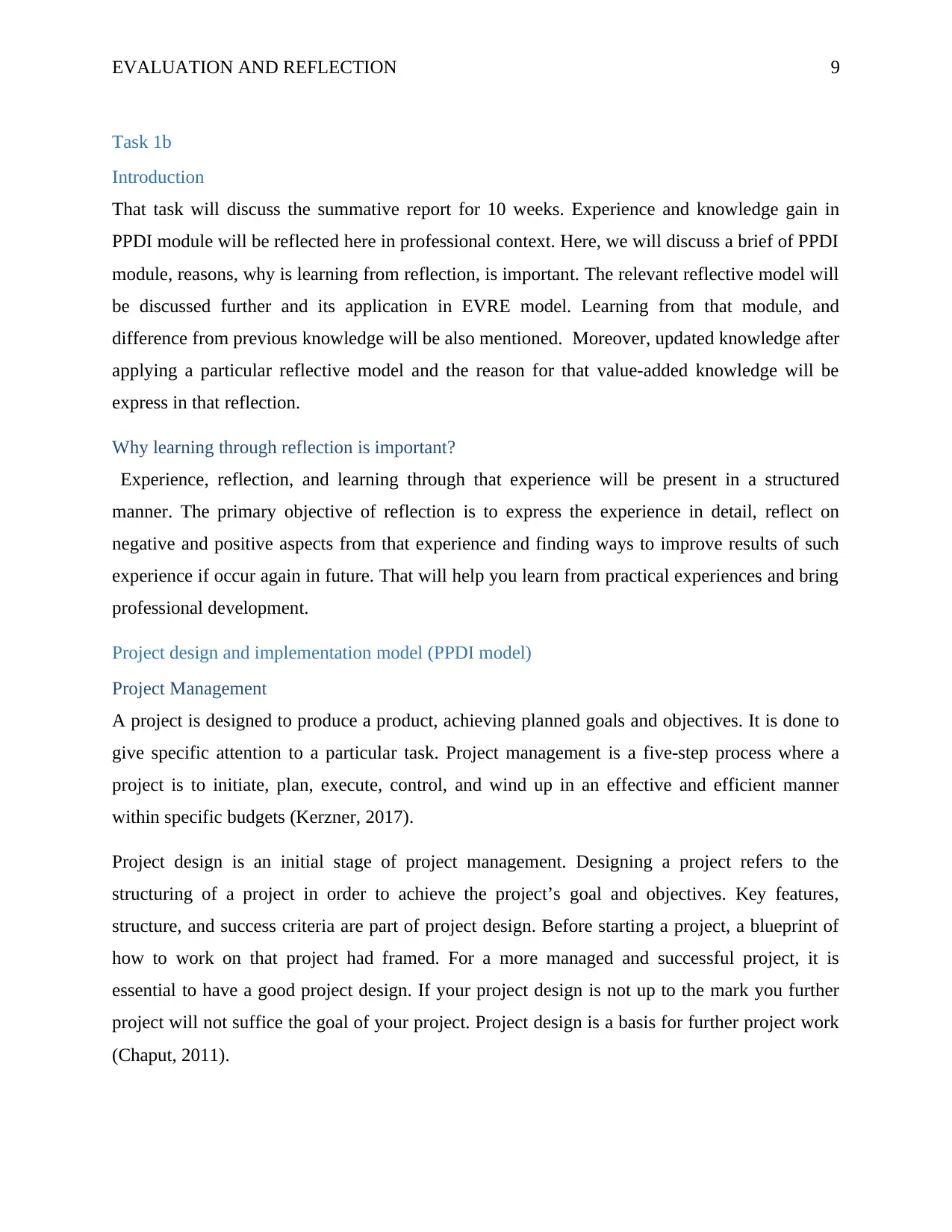
EVALUATION AND REFLECTION 9
Task 1b
Introduction
That task will discuss the summative report for 10 weeks. Experience and knowledge gain in
PPDI module will be reflected here in professional context. Here, we will discuss a brief of PPDI
module, reasons, why is learning from reflection, is important. The relevant reflective model will
be discussed further and its application in EVRE model. Learning from that module, and
difference from previous knowledge will be also mentioned. Moreover, updated knowledge after
applying a particular reflective model and the reason for that value-added knowledge will be
express in that reflection.
Why learning through reflection is important?
Experience, reflection, and learning through that experience will be present in a structured
manner. The primary objective of reflection is to express the experience in detail, reflect on
negative and positive aspects from that experience and finding ways to improve results of such
experience if occur again in future. That will help you learn from practical experiences and bring
professional development.
Project design and implementation model (PPDI model)
Project Management
A project is designed to produce a product, achieving planned goals and objectives. It is done to
give specific attention to a particular task. Project management is a five-step process where a
project is to initiate, plan, execute, control, and wind up in an effective and efficient manner
within specific budgets (Kerzner, 2017).
Project design is an initial stage of project management. Designing a project refers to the
structuring of a project in order to achieve the project’s goal and objectives. Key features,
structure, and success criteria are part of project design. Before starting a project, a blueprint of
how to work on that project had framed. For a more managed and successful project, it is
essential to have a good project design. If your project design is not up to the mark you further
project will not suffice the goal of your project. Project design is a basis for further project work
(Chaput, 2011).
Task 1b
Introduction
That task will discuss the summative report for 10 weeks. Experience and knowledge gain in
PPDI module will be reflected here in professional context. Here, we will discuss a brief of PPDI
module, reasons, why is learning from reflection, is important. The relevant reflective model will
be discussed further and its application in EVRE model. Learning from that module, and
difference from previous knowledge will be also mentioned. Moreover, updated knowledge after
applying a particular reflective model and the reason for that value-added knowledge will be
express in that reflection.
Why learning through reflection is important?
Experience, reflection, and learning through that experience will be present in a structured
manner. The primary objective of reflection is to express the experience in detail, reflect on
negative and positive aspects from that experience and finding ways to improve results of such
experience if occur again in future. That will help you learn from practical experiences and bring
professional development.
Project design and implementation model (PPDI model)
Project Management
A project is designed to produce a product, achieving planned goals and objectives. It is done to
give specific attention to a particular task. Project management is a five-step process where a
project is to initiate, plan, execute, control, and wind up in an effective and efficient manner
within specific budgets (Kerzner, 2017).
Project design is an initial stage of project management. Designing a project refers to the
structuring of a project in order to achieve the project’s goal and objectives. Key features,
structure, and success criteria are part of project design. Before starting a project, a blueprint of
how to work on that project had framed. For a more managed and successful project, it is
essential to have a good project design. If your project design is not up to the mark you further
project will not suffice the goal of your project. Project design is a basis for further project work
(Chaput, 2011).
Paraphrase This Document
Need a fresh take? Get an instant paraphrase of this document with our AI Paraphraser
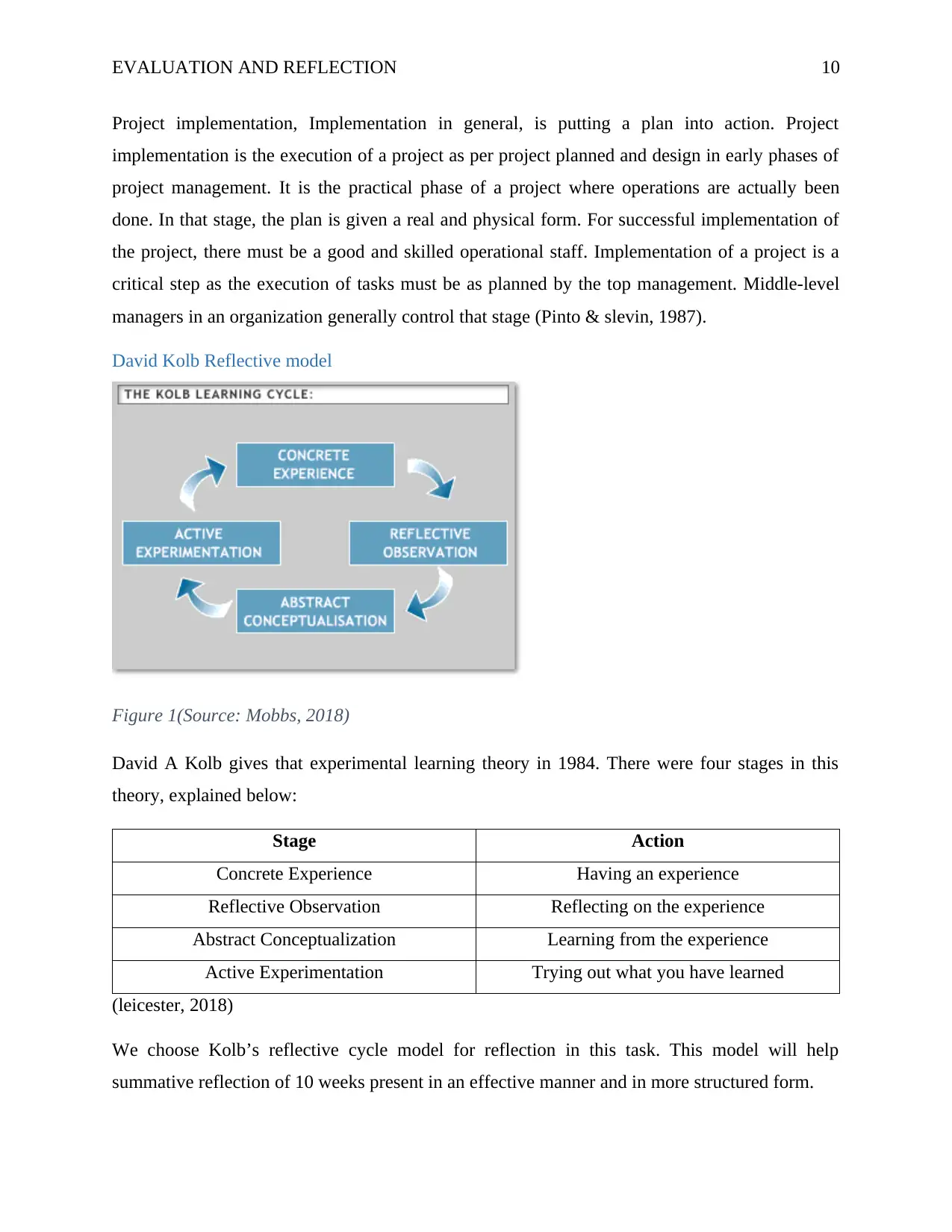
EVALUATION AND REFLECTION 10
Project implementation, Implementation in general, is putting a plan into action. Project
implementation is the execution of a project as per project planned and design in early phases of
project management. It is the practical phase of a project where operations are actually been
done. In that stage, the plan is given a real and physical form. For successful implementation of
the project, there must be a good and skilled operational staff. Implementation of a project is a
critical step as the execution of tasks must be as planned by the top management. Middle-level
managers in an organization generally control that stage (Pinto & slevin, 1987).
David Kolb Reflective model
Figure 1(Source: Mobbs, 2018)
David A Kolb gives that experimental learning theory in 1984. There were four stages in this
theory, explained below:
Stage Action
Concrete Experience Having an experience
Reflective Observation Reflecting on the experience
Abstract Conceptualization Learning from the experience
Active Experimentation Trying out what you have learned
(leicester, 2018)
We choose Kolb’s reflective cycle model for reflection in this task. This model will help
summative reflection of 10 weeks present in an effective manner and in more structured form.
Project implementation, Implementation in general, is putting a plan into action. Project
implementation is the execution of a project as per project planned and design in early phases of
project management. It is the practical phase of a project where operations are actually been
done. In that stage, the plan is given a real and physical form. For successful implementation of
the project, there must be a good and skilled operational staff. Implementation of a project is a
critical step as the execution of tasks must be as planned by the top management. Middle-level
managers in an organization generally control that stage (Pinto & slevin, 1987).
David Kolb Reflective model
Figure 1(Source: Mobbs, 2018)
David A Kolb gives that experimental learning theory in 1984. There were four stages in this
theory, explained below:
Stage Action
Concrete Experience Having an experience
Reflective Observation Reflecting on the experience
Abstract Conceptualization Learning from the experience
Active Experimentation Trying out what you have learned
(leicester, 2018)
We choose Kolb’s reflective cycle model for reflection in this task. This model will help
summative reflection of 10 weeks present in an effective manner and in more structured form.
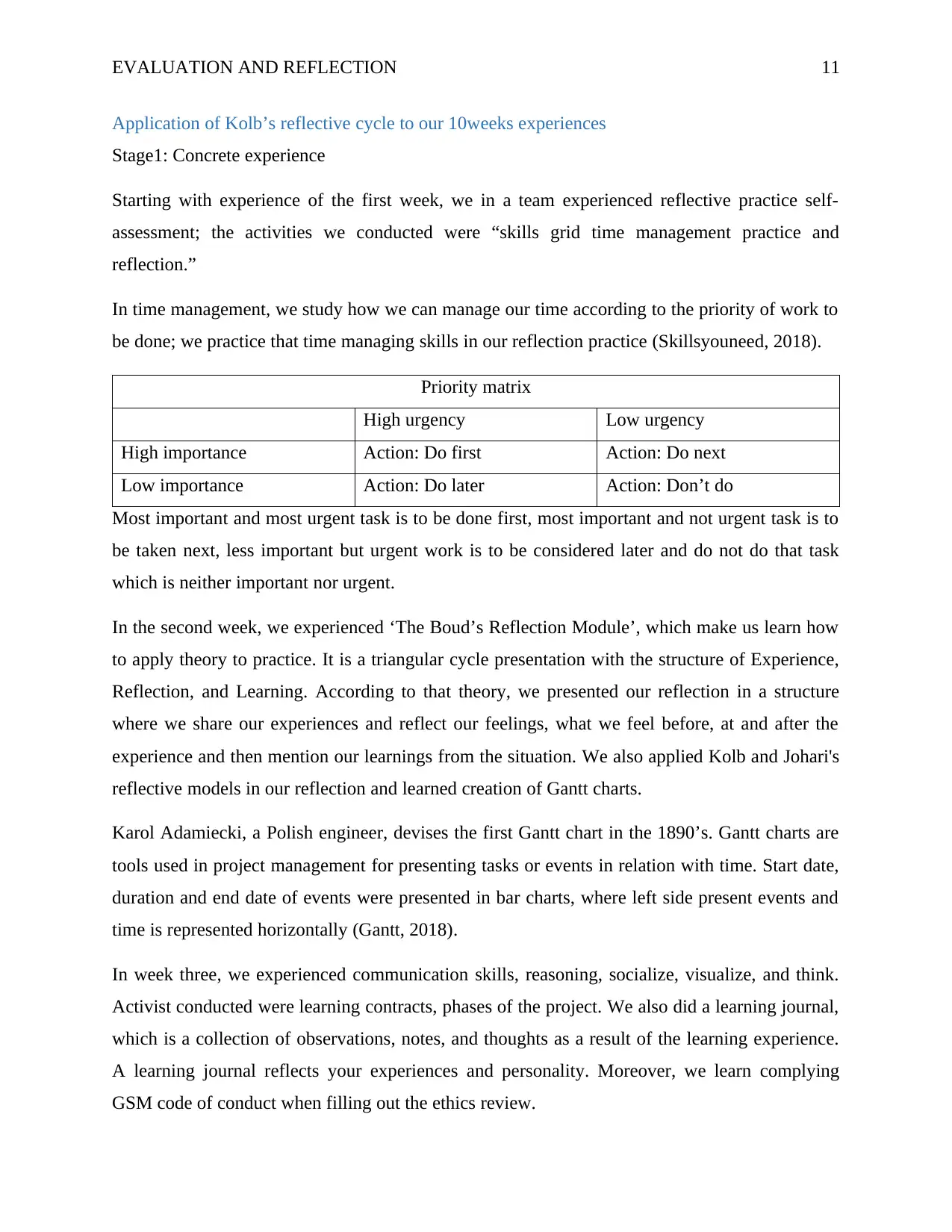
EVALUATION AND REFLECTION 11
Application of Kolb’s reflective cycle to our 10weeks experiences
Stage1: Concrete experience
Starting with experience of the first week, we in a team experienced reflective practice self-
assessment; the activities we conducted were “skills grid time management practice and
reflection.”
In time management, we study how we can manage our time according to the priority of work to
be done; we practice that time managing skills in our reflection practice (Skillsyouneed, 2018).
Priority matrix
High urgency Low urgency
High importance Action: Do first Action: Do next
Low importance Action: Do later Action: Don’t do
Most important and most urgent task is to be done first, most important and not urgent task is to
be taken next, less important but urgent work is to be considered later and do not do that task
which is neither important nor urgent.
In the second week, we experienced ‘The Boud’s Reflection Module’, which make us learn how
to apply theory to practice. It is a triangular cycle presentation with the structure of Experience,
Reflection, and Learning. According to that theory, we presented our reflection in a structure
where we share our experiences and reflect our feelings, what we feel before, at and after the
experience and then mention our learnings from the situation. We also applied Kolb and Johari's
reflective models in our reflection and learned creation of Gantt charts.
Karol Adamiecki, a Polish engineer, devises the first Gantt chart in the 1890’s. Gantt charts are
tools used in project management for presenting tasks or events in relation with time. Start date,
duration and end date of events were presented in bar charts, where left side present events and
time is represented horizontally (Gantt, 2018).
In week three, we experienced communication skills, reasoning, socialize, visualize, and think.
Activist conducted were learning contracts, phases of the project. We also did a learning journal,
which is a collection of observations, notes, and thoughts as a result of the learning experience.
A learning journal reflects your experiences and personality. Moreover, we learn complying
GSM code of conduct when filling out the ethics review.
Application of Kolb’s reflective cycle to our 10weeks experiences
Stage1: Concrete experience
Starting with experience of the first week, we in a team experienced reflective practice self-
assessment; the activities we conducted were “skills grid time management practice and
reflection.”
In time management, we study how we can manage our time according to the priority of work to
be done; we practice that time managing skills in our reflection practice (Skillsyouneed, 2018).
Priority matrix
High urgency Low urgency
High importance Action: Do first Action: Do next
Low importance Action: Do later Action: Don’t do
Most important and most urgent task is to be done first, most important and not urgent task is to
be taken next, less important but urgent work is to be considered later and do not do that task
which is neither important nor urgent.
In the second week, we experienced ‘The Boud’s Reflection Module’, which make us learn how
to apply theory to practice. It is a triangular cycle presentation with the structure of Experience,
Reflection, and Learning. According to that theory, we presented our reflection in a structure
where we share our experiences and reflect our feelings, what we feel before, at and after the
experience and then mention our learnings from the situation. We also applied Kolb and Johari's
reflective models in our reflection and learned creation of Gantt charts.
Karol Adamiecki, a Polish engineer, devises the first Gantt chart in the 1890’s. Gantt charts are
tools used in project management for presenting tasks or events in relation with time. Start date,
duration and end date of events were presented in bar charts, where left side present events and
time is represented horizontally (Gantt, 2018).
In week three, we experienced communication skills, reasoning, socialize, visualize, and think.
Activist conducted were learning contracts, phases of the project. We also did a learning journal,
which is a collection of observations, notes, and thoughts as a result of the learning experience.
A learning journal reflects your experiences and personality. Moreover, we learn complying
GSM code of conduct when filling out the ethics review.
⊘ This is a preview!⊘
Do you want full access?
Subscribe today to unlock all pages.

Trusted by 1+ million students worldwide
1 out of 27
Related Documents
Your All-in-One AI-Powered Toolkit for Academic Success.
+13062052269
info@desklib.com
Available 24*7 on WhatsApp / Email
![[object Object]](/_next/static/media/star-bottom.7253800d.svg)
Unlock your academic potential
Copyright © 2020–2026 A2Z Services. All Rights Reserved. Developed and managed by ZUCOL.


